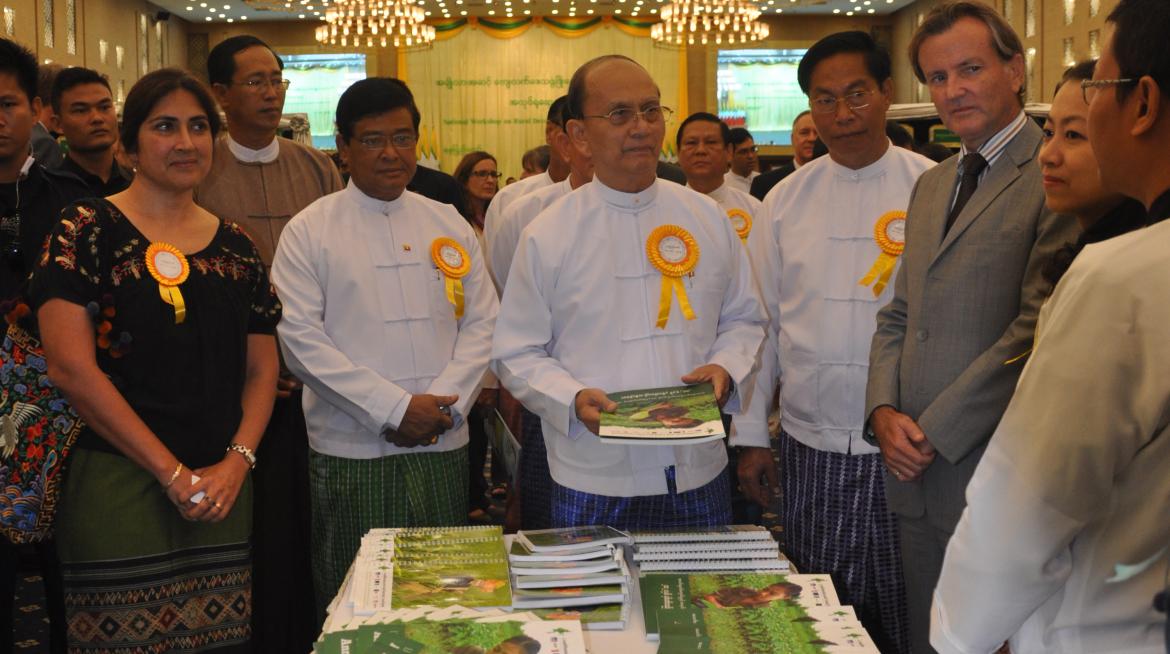
18 November 2013 -- President H.E. U Thein Sein highlighted rural development as a key focus area for Myanmar’s economic development at the opening of the National Workshop on Rural Development Strategic Framework convened by the Ministry of Livestock, Fisheries, and Rural Development and the Livelihoods and Food Security Trust Fund (LIFT) in Nay Pyi Taw.
The workshop brought together more than 400 people from the government, development partners, INGOs, and CSOs to provide inputs into the Rural Development Strategic Framework that sets out a two year plan to reduce poverty across Myanmar.
“Seventy percent of the population live in rural areas and the poverty incidence in rural areas in the highest,” highlighted the President. H.E. U Thein Sein continued that Myanmar needs to continue “put more effort to the socio-economic development. For the economic aspect, the focus needs to be on 1) food security, 2) rural development and poverty reduction, and 3) sustainable economic development.”
The LIFT donors welcomed the focus on the poor and on small-holders – both the backbone of the agricultural sector and the majority of poor people in this country. The centrality of economic growth in poverty reduction, and the policy to lay the foundation for economic development was stressed by several speakers. The importance of addressing the “growth motors” for rural economic development was also highlighted by the speakers from LIFT, Myanmar Development Research Institute/Centre for Economic and Social development (MDRI/CESD), and Michigan State University.
“As the Rural Development Strategic Framework rightly recognizes, value chain and market development as well will be critical to a vibrant rural economy” said the Chair of LIFT Donor Consortium and the Head of DFID Office in Myanmar, H.E. Gavin McGillivray. Adding that evidence shows that rural poverty can be reduced when linked to value chain development, and that new infrastructure is accompanied by enabling conditions such as credit, governance, access to inputs, and policies.
Also in the opening presentation, H.E. Roland Kobia, the Chair of LIFT Fund Board and the European Union Ambassador to Myanmar highlighted that rural population “need more support to fulfil their agricultural potential, and they also need to be supported with alternative livelihoods to help them move out of poverty”.
In a session dealing with sustainable financing, Chris Milligan, USAID Mission Director urged the government to unleash the power of mobile banking along with the right policy and framework as it would automatically provide credit into the hands of more than 20 million cell phone users across Myanmar. Mobile banking has revolutionized access to finance and boosted rural incomes in Kenya and Philippines.
In the closing remarks, H.E. U Ohn Myint, the Union Minister of Ministry of Livestock, Fisheries and Rural Development added that the “strategic framework will be finalized though the suggestions and comments provided by the participants and through the outcomes of today workshop”. He added the next steps would be to “establish a Consortium of Development Partners and develop an action plan that integrates markets and private sector as an entry point for economic growth”.
H.E. U Ohn Myint expressed his sincere appreciation to everyone, particularly LIFT, EcoDev, Michigan State University’s Professor Reardon, MDRI/CESD and members of the Task Force whose dedication and efforts contributed to the achievement of this national workshop on rural development.


